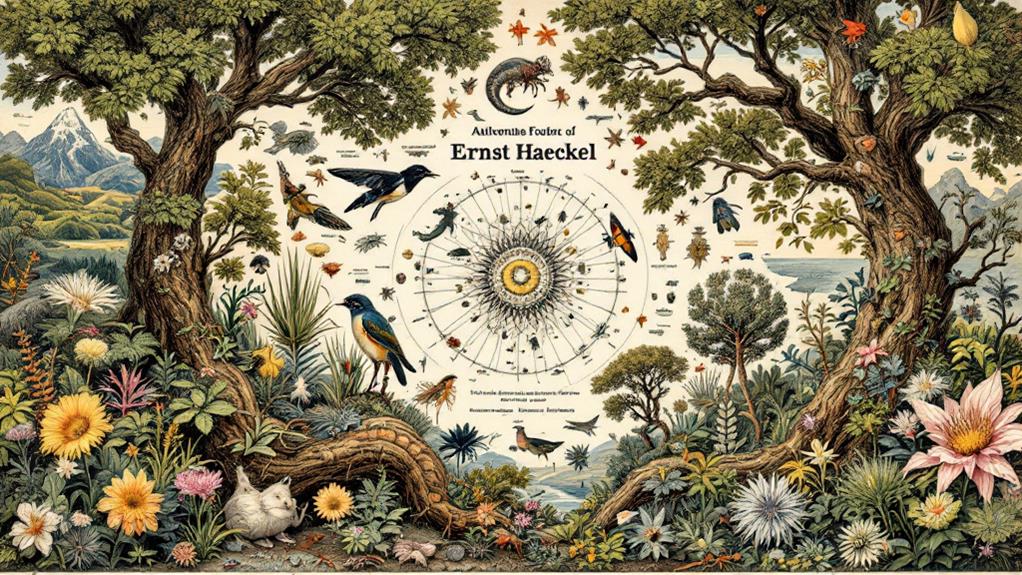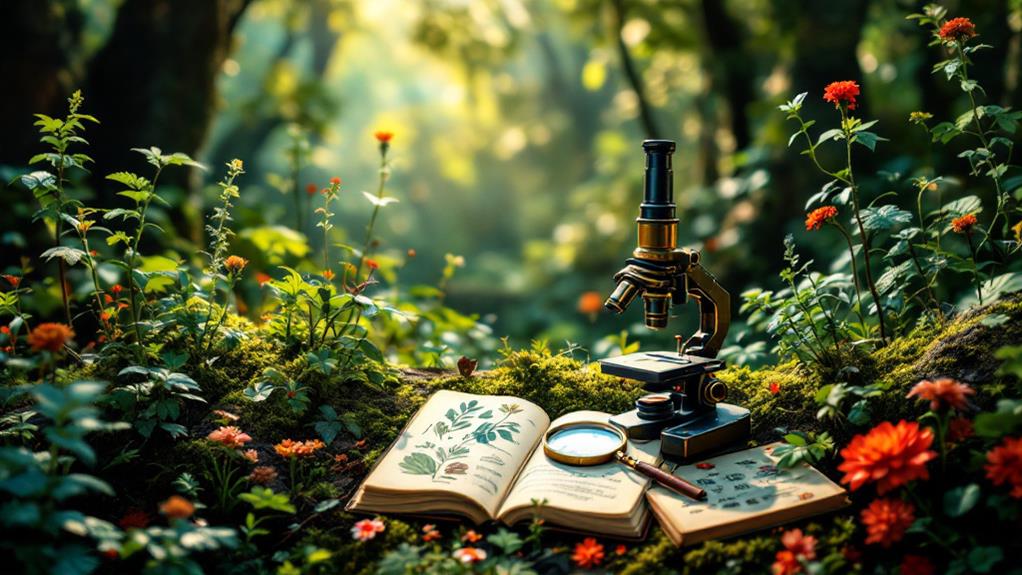The Origins of Ecology: When Did the Study Begin and Who Founded It?

Ecology's roots trace back to ancient civilizations, but it emerged as a formal discipline in the late 19th century. While no single person "founded" ecology, Ernst Haeckel coined the term "oekologie" in 1866. However, earlier naturalists like Carl Linnaeus and Georges-Louis Leclerc laid indispensable groundwork. Charles Darwin's work on evolution profoundly influenced ecological thinking. The field truly took shape with contributions from researchers like Eugenius Warming and Charles Elton in the early 20th century. Today, ecology encompasses a wide range of subdisciplines, from plant and animal ecology to ecosystem studies. Exploring its rich history reveals the interconnectedness of all living things.
Ancient Roots of Ecological Thought
Stretching back millennia, the roots of ecological thought can be traced to ancient civilizations. You'll find evidence of early ecological understanding in various cultures around the world. Ancient Greek philosophers, for instance, made significant contributions to the field. Aristotle's work on animal classification and behavior laid the groundwork for future ecological studies. His student, Theophrastus, often called the "father of botany," wrote extensively about plant geography and the relationships between plants and their environment.
In the East, early Chinese naturalists also developed sophisticated ecological concepts. The I Ching, an ancient Chinese text, discusses the interconnectedness of nature and human society. Chinese scholars like Zou Yan examined the idea of natural cycles and the balance between different elements in nature.
These ancient thinkers didn't use the term "ecology," but their observations and theories about the natural world formed the basis for later ecological studies. They recognized patterns in nature, studied the relationships between organisms and their environments, and pondered humanity's place within the natural world. Their understandings continue to influence modern ecological thought and research methods.
Natural History and Early Observations
As scientific thought evolved during the Renaissance and Enlightenment periods, natural history emerged as an essential stepping stone towards modern ecology. You'll find that early naturalists began to systematically observe and document the world around them, laying the groundwork for future ecological studies.
During this time, you'd see scholars venturing into the field, armed with field journals to record their observations. They'd carefully note details about plants, animals, and their environments. These observational methods became increasingly sophisticated, as naturalists developed techniques for cataloging species, describing habitats, and noting interactions between organisms.
You might recognize names like Carl Linnaeus, who established the binomial system of naming species, or Georges-Louis Leclerc, Comte de Buffon, who wrote extensively on natural history. Their work, along with many others, contributed to a growing body of knowledge about the natural world.
As you investigate this era, you'll notice that while these early naturalists weren't ecologists in the modern sense, their detailed observations and attempts to classify and understand nature paved the way for the development of ecology as a scientific discipline.
Enlightenment Era Ecological Insights

The Enlightenment era brought forth significant advancements in ecological understanding. You'll find that this period, spanning roughly from the late 17th to the late 18th century, saw a surge in scientific inquiry and rational thought. Enlightenment era philosophy encouraged thinkers to question established beliefs and seek empirical evidence, which greatly influenced the study of nature.
During this time, you'll encounter notable figures like Carl Linnaeus, who developed a system for classifying organisms that's still used today. His work laid the foundation for understanding biodiversity and ecological relationships. You'll also uncover Georges-Louis Leclerc, Comte de Buffon, who proposed early theories on species distribution and environmental influences on organisms.
Enlightenment scientific discoveries in geology and paleontology contributed to a deeper grasp of Earth's history and the concept of extinction. You'll see how these observations challenged the prevailing notion of a static, unchanging natural world. The era's emphasis on observation and experimentation paved the way for future ecological studies, encouraging scientists to investigate the intricate connections between living organisms and their environments.
Biogeography and Species Distribution
Biogeography and species distribution emerged as pivotal areas of study in the early development of ecology. You'll find that these fields scrutinize how organisms are distributed across geographical regions and why certain species thrive in specific habitats. As you delve deeper, you'll uncover that biogeography combines elements of biology, geography, and geology to explain patterns of biodiversity.
Early ecological pioneers recognized the importance of habitat selection and resource partitioning in shaping species distribution. They observed that:
- Animals and plants aren't randomly distributed
- Geographical barriers influence species ranges
- Climate plays a crucial role in determining habitats
- Competition affects resource utilization
- Evolutionary history impacts current distributions
You'll see that biogeography has roots in the work of naturalists like Alexander von Humboldt, who studied plant distributions across continents. As you explore further, you'll encounter Alfred Russel Wallace's contributions to island biogeography and Charles Darwin's observations on species adaptations to different environments. These early insights laid the foundation for modern ecological theories and continue to shape our understanding of how organisms interact with their surroundings and each other in complex ecosystems.
Haeckel's Oekologie

German biologist Ernst Haeckel coined the term "oekologie" in 1866, marking a vital moment in the development of ecology as a distinct scientific discipline. Haeckel defined oekologie as the study of organisms' relationships with their environment, including both living and non-living components. This comprehensive approach laid the foundation for modern ecological thinking.
You'll find that Haeckel's work was pioneering in its holistic viewpoint. He emphasized the interconnectedness of species and their surroundings, anticipating the concepts of ecosystems that would later become central to ecological studies. His ideas influenced future generations of scientists and helped shape the field as we comprehend it today.
Haeckel's oekologie went beyond mere observation of nature. It encouraged a systematic approach to understanding the complex web of interactions within biological communities. This framework has had a lasting influence on modern ecology, informing research methodologies and theoretical models. While the field has developed substantially since Haeckel's time, his initial conceptualization of ecology as a unified science continues to resonate in contemporary ecological studies and environmental management practices.
Darwin's Influence on Ecology
Charles Darwin's pioneering work on evolution profoundly influenced the emerging field of ecology. His evolutionary theory provided a framework for understanding how species adapt to their environments and interact with one another. You'll find that Darwin's ideas shaped the way ecologists view ecological processes and the relationships between organisms and their habitats.
Darwin's influence on ecology can be seen in several key areas:
- Natural selection as a driving force in ecosystems
- Competition and adaptation as central ecological concepts
- The importance of species interactions in shaping communities
- Recognition of the fluid nature of ecosystems
- The interconnectedness of all living things
You'll notice that these ideas form the foundation of modern ecological thinking. Darwin's work encouraged scientists to contemplate the complex web of relationships in nature and how they change over time. His emphasis on the struggle for existence and the role of environmental factors in shaping populations continues to inform ecological research today. By integrating evolutionary theory with ecological processes, Darwin laid the groundwork for a more extensive understanding of the natural world, contributing to future developments in the field of ecology.
Emergence of Plant Ecology

As Darwin's ideas took root, a new branch of ecological study began to flourish. You'll find that plant ecology emerged as a distinct discipline in the late 19th century, with scientists focusing on how plants interact with their environment and each other. This field gained momentum through pioneering field studies conducted by researchers who sought to understand plant distribution and adaptation.
You'll see that early plant community concepts were developed during this time. Scientists like Eugenius Warming and Andreas Schimper investigated how plant communities form and function in different environments. They observed patterns in plant distribution and began to formulate theories about plant succession and adaptation to environmental factors.
You'll notice that these early plant ecologists laid the groundwork for modern ecological thinking. They introduced methods for studying plant communities in their natural habitats and constructed frameworks for understanding plant-environment relationships. Their work paved the way for future research in areas such as ecosystem dynamics, biodiversity, and conservation biology. As you survey the history of ecology, you'll recognize the significant impact of these early plant ecology studies on the field's development.
Animal Ecology Takes Shape
While plant ecology was establishing itself, animal ecology began to emerge as a distinct field of study in the early 20th century. You'll find that pioneers like Charles Elton and Raymond Lindeman made significant contributions to this developing discipline. Elton's work on animal community structure and food web versatility laid the foundation for understanding ecosystems as interconnected networks of species.
As animal ecology evolved, researchers focused on:
- Population dynamics
- Predator-prey relationships
- Behavioral adaptations
- Species interactions
- Habitat preferences
You'll notice that these areas of study helped scientists gain a more wide-ranging understanding of how animals function within their environments. The field expanded rapidly, with researchers exploring topics like migration patterns, social behavior, and the impact of environmental changes on animal populations.
Modern Synthesis in Ecology

The modern synthesis in ecology emerged in the mid-20th century, integrating ideas from various subdisciplines. This period marked a significant shift in ecological thinking, as researchers began to combine insights from population genetics, evolutionary biology, and ecosystem studies.
You'll find that this synthesis emphasized the importance of understanding population dynamics and community interactions within a broader ecological context. Scientists like G. Evelyn Hutchinson and Robert MacArthur played pivotal roles in developing mathematical models to explain species diversity and niche partitioning.
The modern synthesis also brought attention to the role of energy flow and nutrient cycling in ecosystems. You'll see how Ramon Margalef's work on information theory in ecology and Howard Odum's systems approach contributed to this understanding.
During this time, ecologists began to recognize the interconnectedness of biological and physical processes. You'll notice that this holistic view led to the development of new research methods and theoretical frameworks. The synthesis helped bridge the gap between laboratory experiments and field observations, paving the way for more comprehensive ecological studies.



